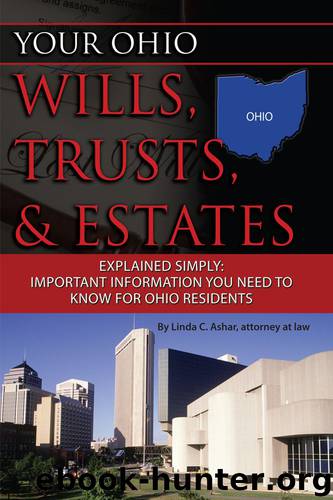Your Ohio Wills, Trusts, & Estates Explained Simply: Important Information You Need to Know for Ohio Residents by Linda C. Ashar

Author:Linda C. Ashar
Language: eng
Format: epub
Tags: Ohio, wills, trusts, estates, estate planning, beneficiary, probate, trustee, assets executor, life insurance, power of attorney, advance directives, state law
Publisher: Atlantic Publishing Group
Published: 2012-03-22T00:00:00+00:00
Varying Beneficiaries
No matter what kind of insurance you decide to purchase, you can choose different beneficiaries depending on what the policy is going to do. To start, consider the goal of the policy, per the opening section of this chapter, and then who will need or use that money for that purpose. A life insurance policy that is specifically set up to give your family time to grieve might name your spouse as the beneficiary because he or she, not your estate, will pay the utility bills and buy the groceries.
No matter whom you name as the beneficiary, it is important to name an alternative beneficiary. If the first beneficiary dies before you or declines the gift, the second person or institution named will receive the benefit. If the death benefit goes unclaimed, then it is added to your estate and heads to probate for distribution by the court. Creditors and others may get more of the money than family, friends, or a charity you wish to support, depending on what is owed at the time of your death.
There will be tax implications for all beneficiaries, some more significant than others. A life insurance policy payout is taxable income, so you might want to consider making your spouse or minor children the beneficiaries. They can take advantage of the marital and minor child exceptions, respectively, to avoid having to pay income tax. You could also make a life insurance policy payable to a charity; their tax-exempt status means they do not have to pay tax, and your estate gets to use the charitable deduction for estate-tax purposes.
Another way to get around the income and estate-tax implications is to transfer ownership of your policy to someone else. If your granddaughter holds your life insurance policy, then she owns it and names the beneficiaries, not you. The advantage of this setup is that your estate will not own the policy and have to pay taxes on the death benefit. That does not remove the income-tax implication for the beneficiary, but it does reduce the number of times that money can be taxed.
If your life insurance policy is already in place in your name and you want to make that transfer, be sure to consult with a tax specialist because that gift could be subject to state and federal gift taxes. Add on the income-tax implication for someone who does not have an exemption, such as a spouse or a minor child, and it might not be such a good idea after all.
Then there is the three-year rule. If you transfer ownership on your life insurance policy and you die within three years, the death benefit is added to the value of your estate and is subject to state and federal estate taxation.
Case Study: Insurance: More than Life Coverage
Linda Horn
Chief Executive Officer
Capital Concepts
www.capitalconcepts.net
Some people only buy insurance, and others diversify their
investments. What is the benefit of having a large amount of
insurance?
Tax-free income to your family or a charity is a benefit. Proceeds from a policy are often used to provide additional funds to pay the estate taxes.
Download
This site does not store any files on its server. We only index and link to content provided by other sites. Please contact the content providers to delete copyright contents if any and email us, we'll remove relevant links or contents immediately.
| Estates & Trusts | Living Wills |
| Wills |
American Bar Association Guide to Wills and Estates by American Bar Association(1261)
How to Plan and Settle Estates by Edmund Fleming(1254)
American Bar Association Guide to Wills and Estates, Fourth Edition: An Interactive Guide to Preparing Your Wills, Estates, Trusts, and Taxes by American Bar Association(1219)
Lecretia's Choice by Matt Vickers(1195)
Need you Now (Top Shelf Romance Book 2) by unknow(1163)
Five Last Acts by Chris Docker(1158)
The Essential Executor's Handbook by David G. Hoffman(1157)
To Die For by unknow(1007)
The Green Burial Guidebook by Elizabeth Fournier(972)
Gresham's Law by John Guy(957)
The Playboy of the Western World by J. M. Synge(919)
Protecting Your Assets from Probate and Long-Term Care by Evan H. Farr(914)
Life's Dominion: An Argument About Abortion, Euthanasia, and Individual Freedom by Ronald Dworkin(906)
Beyond the Grave, Revised and Updated Edition: The Right Way and the Wrong Way of Leaving Money to Your Children (and Others) by Jeffery L. Condon(902)
Death City by Sam West(887)
Your Family Legacy: 32 ways to preserve your family's 'wealth' for generations by Palumbos Michael(865)
Estate and Trust Administration For Dummies by Margaret A. Munro & Kathryn A. Murphy Esq(864)
Wills, Trusts, and Estates (Aspen Casebook) by Jesse Dukeminier & Robert H. Sitkoff(820)
Books for Living: A Reader’s Guide to Life by Will Schwalbe(811)
